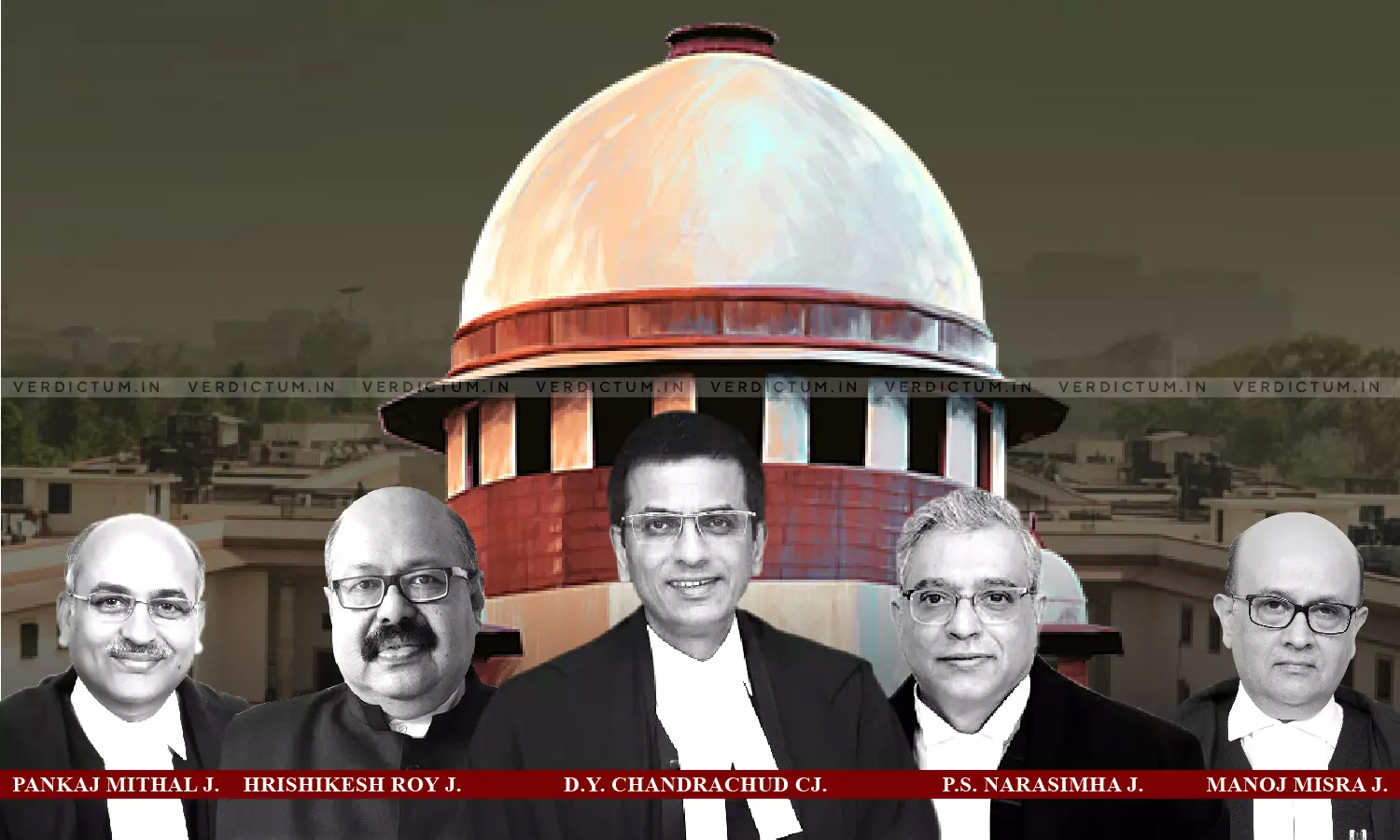
Rules Of Recruitment Cannot Change Mid-Process Unless Specifically Allowed Under Rules And Article 14 Is Satisfied: Supreme Court
 |
|A Constitution Bench of the Supreme Court today held that the procedure for recruitment to a public service cannot change after the commencement of the selection process, unless the rules for recruitment specifically permit and the change in procedure satisfies the test of non-arbitrariness.
The Court stated that if the rules permit or the advertisement for recruitment specifies that the recruiting authority can set benchmarks for different stages of the process "then such benchmarks may be set any time before that stage is reached so that neither the candidate nor the evaluators or examiner or interviewer is taken by surprise."
The five-judge Bench comprised the Chief Justice of India Dr. D.Y. Chandrachud and Justice Hrishikesh Roy, Justice P.S. Narasimha, Justice Pankaj Mithal and Justice Manoj Misra held, "The eligibility criteria for being placed in the 'select list' notified at the commencement of the recruitment process cannot be changed mid-way unless the extant rules permit or the advertisement, if not contrary to the extant rules, permits. If such change is permissible under the extant rules or the advertisement, the change would have to meet the requirement of Article 14 and satisfy the test of non arbitrariness."
The Court held that recruiting bodies, subject to the extant rules, may devise appropriate procedure for recruitment, "provided the procedure so adopted is transparent, non-discriminatory, non-arbitrary and has a rational nexus with the object sought to be achieved." The Court clarified that where the rules are silent or non-existent, "administrative instructions may fill in the gaps."
Placement in the select list does not give any indefeasible right to appointment, the Court clarified, adding that the State or its instrumentalities may choose to not fill up the vacancy. However, if vacancies exist, the recruitment authority cannot arbitrarily deny appointment to a person that is within the zone of consideration in the 'select list', it held.
The issues before the Bench were whether it laid down the correct law in K. Manjusree v State of Andhra Pradesh (2008), and whether the rules of the game qua method and manner of making selection can be changed or altered after commencement of the recruitment process.
The Court observed that the object of any process of selection into a public service is to ensure that a person most suitable for a post is selected and a degree of discretion is necessary to be left for the employer to devise its method to select the candidate most suitable for the post, subject to overarching principles enshrined in Articles 14 and 16 as also the rules governing service and reservation.
The Court stated that the appointing authority or recruiting authority, in absence of rules to the contrary, can devise a procedure for selection of a candidate suitable to the post and in doing so, it may also set benchmarks for different stages of the recruitment process.
However, if any such benchmark is set, the same should be stipulated before the commencement of the recruitment process, it held. But if the extant rules or the advertisement inviting applications empower the competent authority to set benchmarks at different stages of the recruitment process, then such benchmarks may be set any time before that stage is reached so that no party is taken unawares.
On its 2008 Judgment in K. Manjusree, the Court observed that it does not proscribe setting benchmarks at different stages of the recruitment process, but mandates that it should not be set after the stage is over, in other words, after the game has already been played. The Court said this view is in consonance with the rule against arbitrariness enshrined in Article 14 and meets the legitimate expectation of the candidates and also the requirement of transparency in the recruitment of public services and obviates malpractices. The decision in K. Manjusree was, therefore, held to be good law.
The case originated from a notification issued by the Rajasthan High Court inviting applications for the post of 13 translators in September 2009. The Rajasthan High Court Staff Service Rules, 2002, under which the notification was issued, required candidates to appear for a written examination and a personal interview.
After the completion of these two steps, the Chief Justice of the High Court ordered that only those candidates who had secured 75 per cent marks in the written examination would be selected. In view of this decision, only three candidates were found suitable for appointment, out of the 21 who had applied for the post.
This ex post facto rule triggered litigation before the high court, with certain applicants contending that it amounted to “changing the rules of the game after the game is played,” as the Supreme Court’s reference Order from March 2013 notes.
The three-judge Bench referring the case to a larger Bench observed that “an absolute and non-negotiable prohibition against retrospective law making" only applies to criminal law and "any other legal right or obligation could be created, altered, extinguished retrospectively by the sovereign law making bodies."
However, the Court cautioned, "such drastic power is required to be exercised in a manner that it does not conflict with any other constitutionally guaranteed rights, such as, Articles 14 and 16 etc. Changing the ‘rules of game’ either midstream or after the game is played is an aspect of retrospective law making power." The Bench observed that the matter requires “an authoritative pronouncement of a larger Bench of this Court,” and ordered the matter to be placed before the CJI. In June 2023, the case was referred to the present Constitution Bench.
Cause Title: Tej Prakash Pathak & Others v. Rajasthan High Court & Others [C.A. No. 2634/2013]
Click here to read/download the Judgment